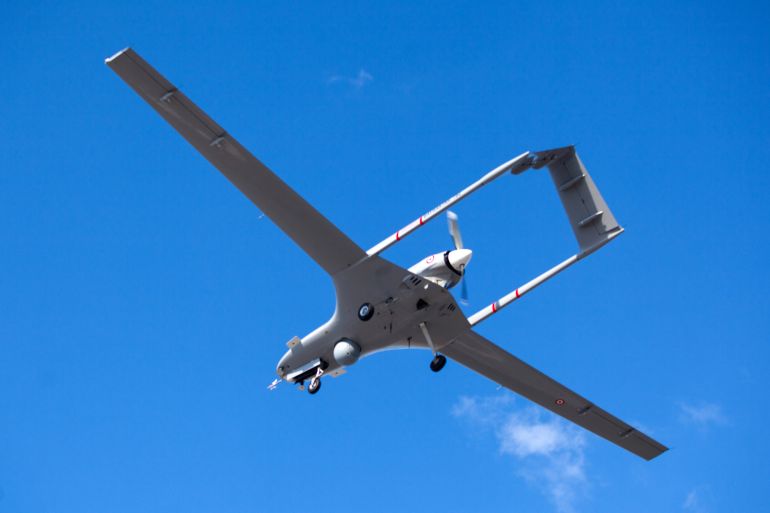Amid war fears, Ukraine stocked up on Turkish defence equipment
A Turkish industry association report shows sales to Kyiv grew in January, as analysts say Ankara’s position as a regional player is growing.

Istanbul, Turkey – Turkey’s defence exports to Ukraine soared in the first quarter of 2022, with most sales taking place the month before Russia’s invasion, according to figures released by the Turkish Exporters’ Assembly on April 6.
Exports totalled $59.8m for the first three months of this year compared with $1.9m during the same period in 2021, according to the industry association, which did not specify which weapons were bought.
Keep reading
list of 4 itemsTurkey says Russia and Ukraine are ‘close to agreement’ in talks
Ukrainian refugees, Russian exiles seek shelter in Turkey
Turkey, a mediator in Ukraine, mends its own ties with neighbours
“Ukraine has recently become one of Turkey’s major defence industry partners. Ukraine ordered Bayraktar TB2 armed drones, MILGEM-class corvettes and during President Recep Tayyip Erdogan’s visit to Kyiv in early February, an agreement on the establishment of a production facility for the TB2s was signed,” Arda Mevlutoğlu, an independent defence analyst, told Al Jazeera.
“The delivery of the TB2s as well as the guided weapons that are used with them were under way when the war broke out. Additionally, there were several other smaller-size contracts with Ukraine, such as communications and targeting systems. One possible reason for the sharp rise of exports could be additional orders by Ukraine for the aforementioned products, including ammunition and equipment.”
Ukraine ordered 16 TB2 drones in January this year and had previously bought at least 20, some of which were deployed last year amid the simmering war in the eastern region of Donbas between Ukrainian forces and Russian-backed separatists.
The drones are designed and produced by private Turkish defence company Baykar, the chief technology officer of which is Selcuk Bayraktar, Erdogan’s son-in-law.
Renowned for being affordable yet sophisticated, they have played a key role in the Ukrainian military’s defence against the Russian invasion.
They are incredibly popular among the public, too. Ukrainians have even composed a patriotic song dedicated to the drone.
But while tied to Ukraine, Turkey also has a working relationship with Russia – one that has upset Ankara’s NATO allies. They were particularly disturbed over its purchase of the Russian-built S-400 missile defence system, which saw Ankara booted from Washington’s F-35 fighter jet programme.
“The senseless politicisation of defence cooperation among NATO allies reduced Turkey’s dependence on foreign governments and pushed Turkish companies to innovate,” Turkey’s communications director Fahrettin Altun wrote in an op-ed published by the Wall Street Journal on March 23.
Selim Koru, an analyst at the Economic Policy Research Foundation of Turkey, told Al Jazeera: “This is the dominant narrative of the Turkish defence industry. It goes back to Cyprus, and how American sanctions at the time led to the establishment of [Turkish defence firm] Aselsan.
“So, Turkey doesn’t actually mind sanctions, because despite the short-term difficulties they bring, the government believes that they pressure the country into developing a more independent military industrial complex. The Bayraktar drone is the symbol of that, because it was developed after Turkey’s experiences procuring killer drones from Israel and trying to procure them from the US in the 2000s and 2010s.”
Meanwhile, the Russians have reportedly expressed their frustration to Turkey regarding the sale of the TB2 drones to Ukraine, another reflection of Ankara’s delicate balancing act.
Turkey has criticised Russia’s invasion, but has not imposed sanctions on Moscow in line with its NATO allies.
“Erdogan has sought to position Turkey as a facilitator of peace talks. To do so, Turkey has to be ‘neutral’, so it has not joined much of NATO’s efforts in providing military aid to Ukraine. Instead, Ankara has allowed its ‘private’ firms to sell aid,” Aaron Stein, research director at the US-based Foreign Policy Research Institute, told Al Jazeera.
The weapons sales may also help Turkey with its broader goal of defence industry development, which analysts say will benefit the country’s status as a regional player.
“In a nutshell, Turkey can help its friends and deter its enemies much more effectively, just like the US and other big arms exporters do. In the future, this could be part of a neighbourhood policy. My understanding, for example, is that sales to African countries have risen significantly. There is a reason for that beyond the immediate financial gain,” Koru said.
With no end in sight to the war in Ukraine, observers said Kyiv will keep buying Turkish defence equipment and suggested sales could continue after the conflict ends.
“The future of the defence cooperation between the two countries depends on how the war will be over. If some kind of a peace deal is established and Ukraine’s economy would support the reorganisation and resupply of its armed forces, Turkey would definitely be one of the first suppliers of equipment and weapons,” Mevlutoglu said.
“The list would, without doubt, include the TB2 drone, as well as small arms, infantry equipment, ammunition and communication systems. Given the good relations between the two countries, I would expect the defence cooperation to extend even further.”